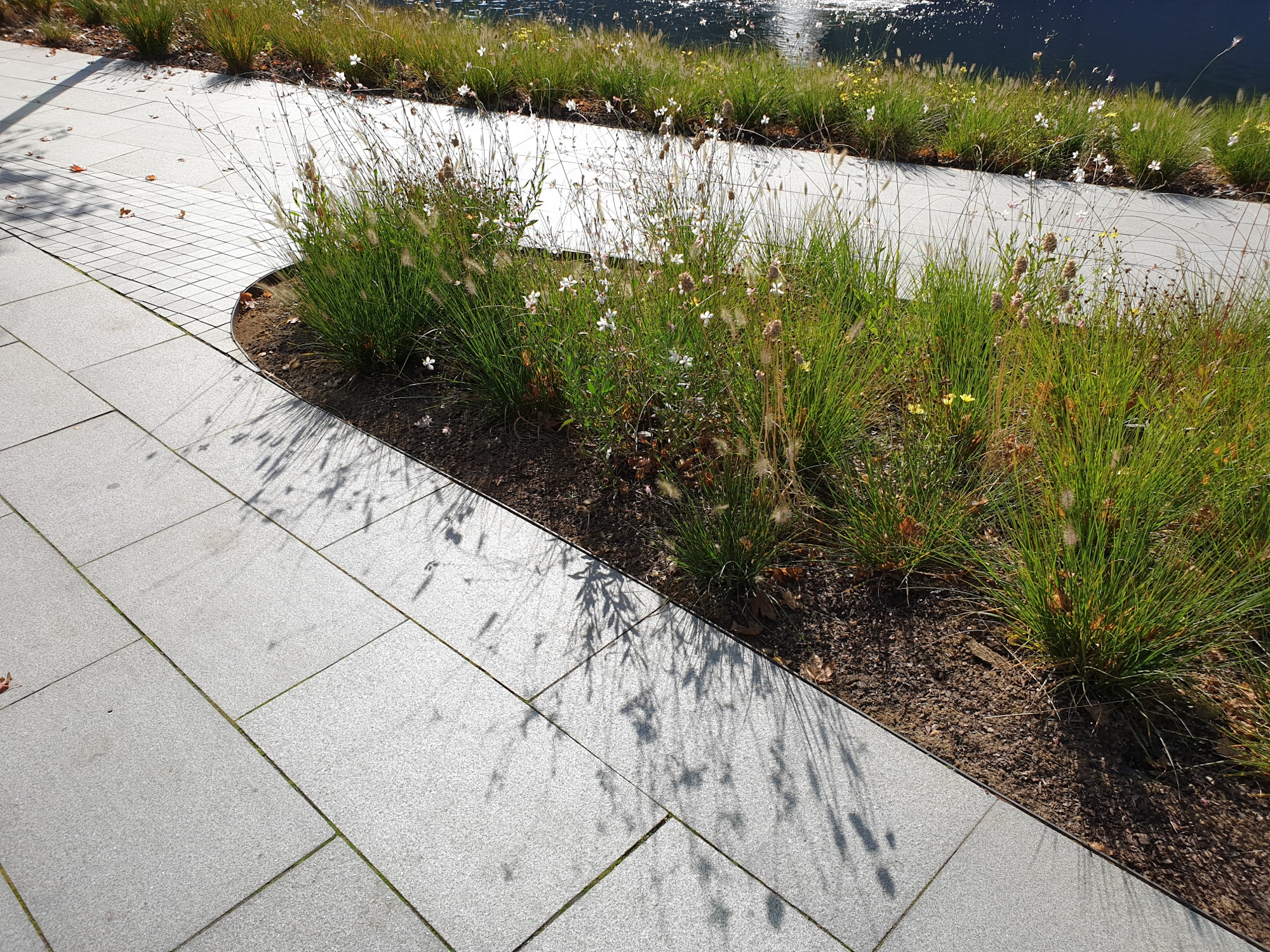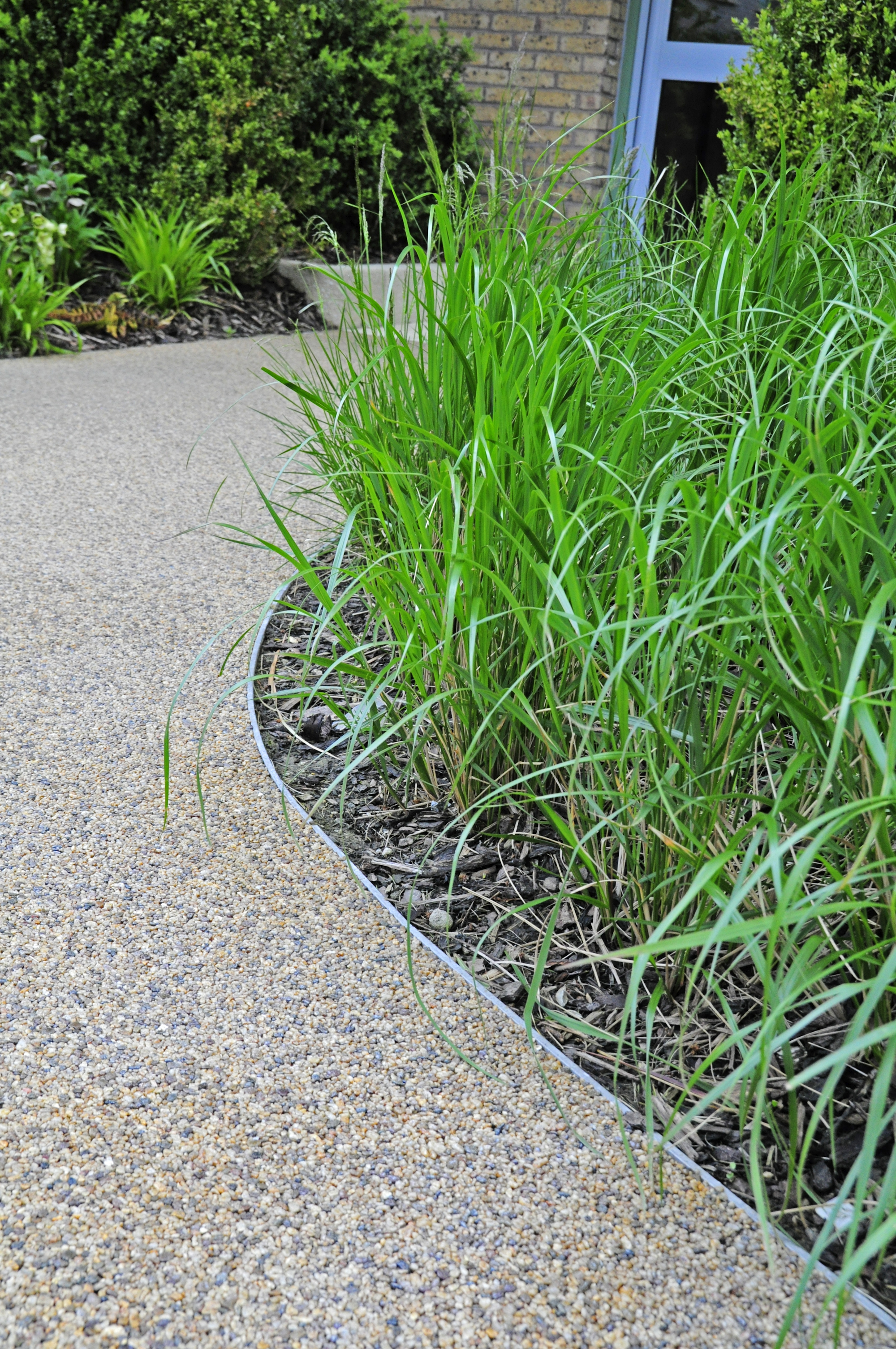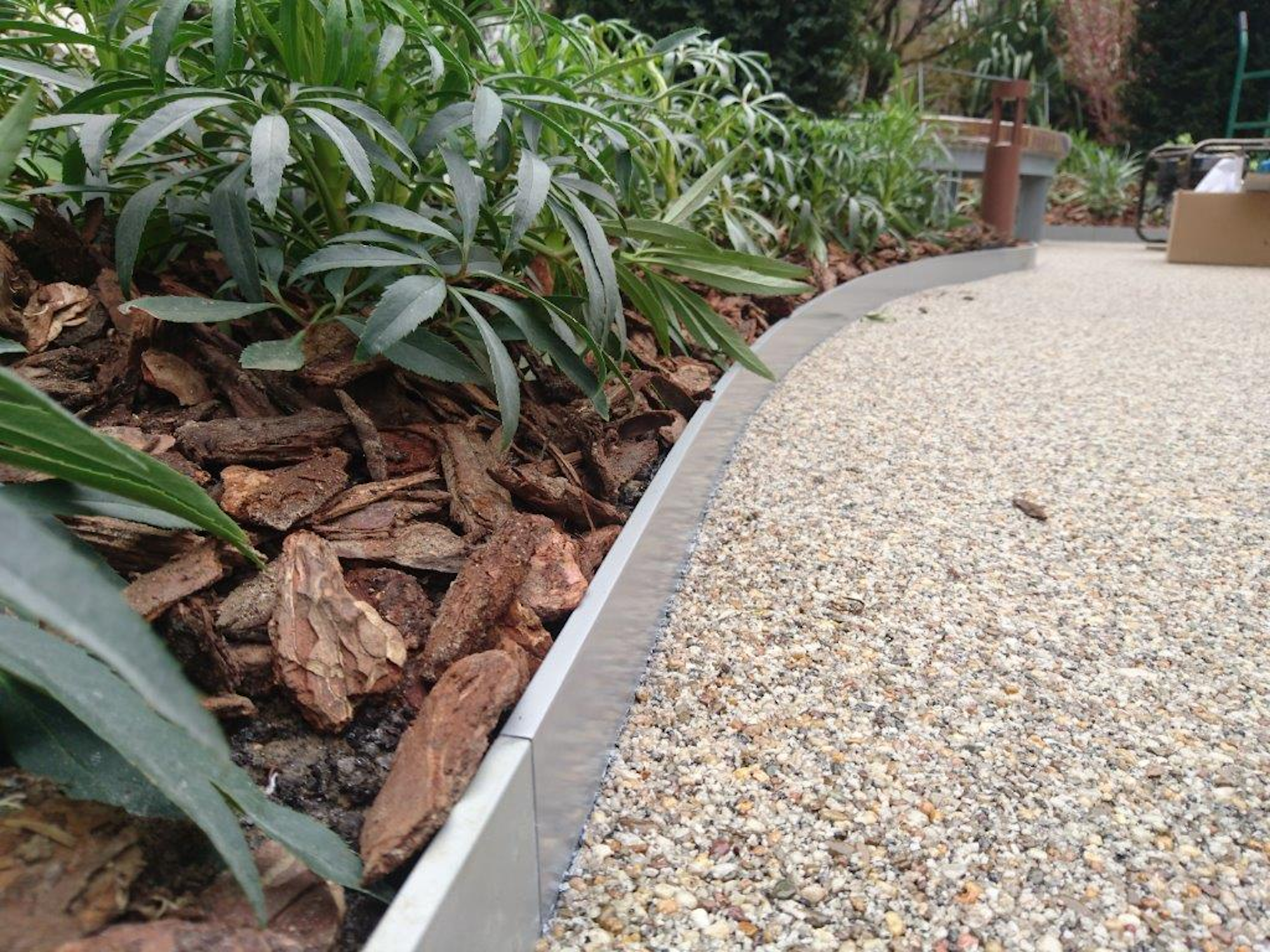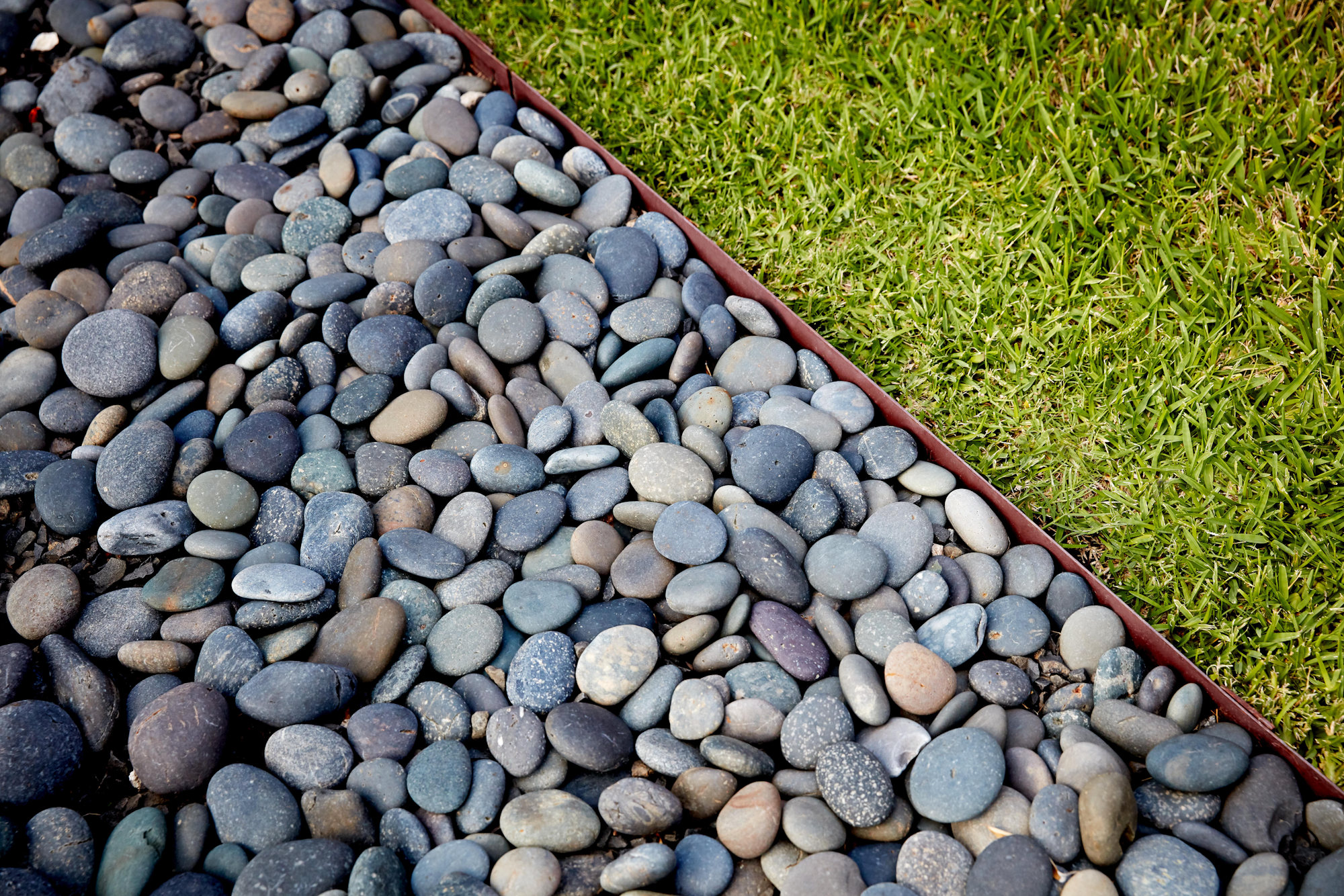Why Paving, Resin & Loose Aggregates Need Edging

The purpose of landscape edging
Most hard landscaping surfaces that are walked or driven on need some form of edging. This serves various functions, from the practical to the aesthetic:
- To protect against edge damage
- To provide a level guide for screeding resin-bound and wet-pour surfaces
- To prevent sideways movement of paving laid on tamped sand
- To create a step up or down between surfaces of a different height
- To contain loose aggregates such as gravel and chippings from spreading into surrounding areas
- To create a clear demarcation between contrasting types or colours of hard landscaping.

Types of landscape edging
Several options are available when choosing the type of edging you need.
Concrete pin kerbing and pavers
Widely used as a heavier-duty edging for asphalt driveways, concrete pin kerbing offers good resistance to ground movement and will generally withstand heavy traffic. It is set on a firm concrete base and haunched with concrete for stability.
Installed on a solid base and haunched, pavers can create a stable edge for block paving or slabs that are laid on tamped sand, and provide an attractive contrast to resin-bound and loose aggregate surfaces such as gravel or granite chippings.
Concrete does however have its disadvantages.
- The acids present in concrete can leach out into surrounding soil, causing unsightly die-back of grass along its perimeter.
- Concrete is the heaviest of all edging products, making it more cumbersome to transport and lay.
- It is also prone to damage from frost and heavy impact.
- The base and haunching take time to lay and cure before backfilling and paving can be carried out.
- Manufactured in a limited range of profiles, pin kerbing doesn’t lend itself to creative landscaping designs.
Timber
Timber is an inexpensive edging material that can be quickly laid. It is popular for asphalt and wet-laid concrete paths as it provides a temporary level for screeding and support during the drying or curing process. it is also used as edging for lawns and planted beds.
Timber is however a very short-term edging solution, as water retained by earth or mulch and the acids in concrete will cause it to quickly deteriorate. Timber shouldn’t be used to edge loose aggregates, as when the timber rots away the aggregate will lose its support and spill over into surrounding areas.
Plastic
Plastic edging is popular among amateur gardeners as doesn’t rot and being lightweight, is easy to lay. It offers little strength or stability but is fine for edging lawns and planted beds. It is however easily damaged by lawnmowers and will become brittle with age and exposure to sunlight.
Aluminium
Aluminium edging is manufactured in various profiles for different applications. It is extremely durable and weatherproof, and its slim profile makes it almost invisible. Light-duty aluminium edging is used for lawns and planted borders, while heavier-duty types are suitable for paving and loose aggregates.
Aluminium edging for resin-bound surfaces provides a perfect level for screeding, forms a stable perimeter and allows the designer to create eye-catching designs in contrasting colours.
Aluminium edging is also quick and easy to install. It can be secured to an existing firm base using standard fixings, or with retaining spikes driven into softer surfaces. Backfilling, paving and screeding can be carried out as soon as the edging is in place.
Aluminium edging may be manufactured in a natural ‘mill’ finish or powder coated to complement its surroundings. It can also be formed in the factory or during installation to create curves and intricate shapes.
Steel
Steel edging has all the benefits of aluminium edging with greater structural strength and stability. It can be supplied as untreated or galvanised steel, Corten weathering steel, or powder coated.
Like aluminium edging, it is easily installed on existing hard surfaces or softer ground, and backfilling, paving and screeding can be carried out as soon as the edging is in place. It can be formed in the factory (lighter-gauge edging can also be formed during installation) to follow curves and create intricate shapes.
Used for paths, drives and roadways, steel edging will withstand heavier impact and hold pavers and loose aggregates firmly in position.

The right edging for your application
You will also need to consider which is the best edging type for the surface you are laying.
Paving
Most paving is laid on tamped sand, sometimes with ‘dot and dab’ concrete to hold it more firmly in place. Without a stable edge, the pavers will eventually become dislodged due to foot or vehicle traffic and ground movement. This will lead to other problems:
- Gaps opening between the pavers will encourage weeds, grass and moss to grow.
- As the pavers loosen the surface will become unstable and create trip hazards
- If the paved area is adjacent to soft landscaping (lawns or planted beds) the edge will start to break away
Pin kerbing or pavers, set on a solid concrete base and haunched, will create a solid edge that can either blend with or complement the rest of the paving.
However, this method may require several site visits to lay the foundation, then lay and haunch the edging, and time between for the base and haunching to cure before the paving can be laid.
If aluminium or steel edging is used, the paving can be laid as soon as the edging is installed. Both products feature a narrow profile that makes them inconspicuous against paving and soft landscaping, and neither has the problem of grass die-back caused by concrete.
Resin-bound aggregates
Resin-bound paths and driveways are increasing in popularity due to their neat appearance, low maintenance requirements and porous surface that reduces rainwater run-off.
As with all wet-laid surfaces, resin-bound aggregates need a level, stable edge to act as a levelling guide during screeding and to hold the resin in place while curing. It also needs to be permanent so the edge of the surface doesn’t deteriorate over time.
The use of contrasting colours to create borders and patterns also requires an edge that is visually unobtrusive and doesn’t detract from the design.
For these reasons, aluminium is the perfect edging for resin-bound surfaces. It is dimensionally stable, strong and won’t deteriorate over time. Its exceptionally narrow profile means it forms a discreet line between contrasting areas that becomes almost invisible as the aluminium weathers and loses its new brightness.
Loose aggregates
While gravel is the most widely used loose aggregate for paths and driveways, granite, marble and other stone are gaining in popularity as decorative finishes.
Loose aggregates are relatively inexpensive and easy to lay, but choosing the right edging product will help to ensure your path or driveway will still look good in years to come.
One problem with loose aggregates is that they always remain loose. Heavy rainfall, ground movement and vehicle or foot traffic will cause the gravel or chippings to shift, pressing against the edging and spreading onto surrounding areas.
A strong, stable edging product will help to prevent some of this from becoming a problem. Where space allows, this could be a row of decorative pavers or paving slabs which would provide a reasonably wide barrier between the path or driveway and the soft landscaping. Any stray gravel or chippings can then be easily swept back into place.
But if space isn’t available or if this isn’t the look you are trying to achieve, aluminium or steel edging are excellent choices. They are easy to install and can be backfilled immediately. To act as a further deterrent to straying gravel you can set them a couple of inches higher than the surface and make a feature of the exposed face. If you don’t want the look of untreated aluminium or steel you can choose from galvanised steel, Corten weathering steel, and powder-coated aluminium or steel matched to any standard RAL colour reference.

Buying your landscape edging
Kinley design and manufacture a wide range of aluminium and steel landscape edging products in the UK:
Steel driveway and gravel path edging
Aluminium garden lawn edging
Aluminium landscape edging
Aluminium edging for resin-bound surfacing
Steel edging for roof gardens and terraces
Steel landscape edging
Heavy-duty steel landscape edging
Heavy-duty steel kerb
If you would like to discuss your edging requirements with a technical advisor, request samples or place an order, contact Kinley Systems on +44 (0)1580 830688 or at sales@kinley.co.uk.
